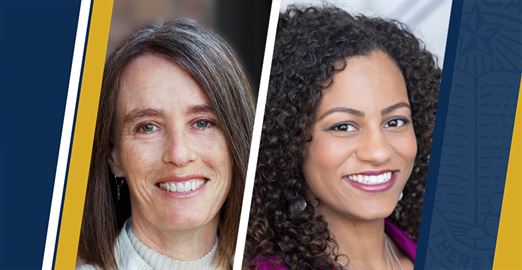
Two female faculty members of UC Merced’s School of Social Sciences, Humanities and Arts (SSHA) have been named the John D. and Catherine T. MacArthur Foundation chairs, making four prestigious chairs in the campus’ 15-year history.
Professors Nancy Burke and Whitney Pirtle have been recognized as the two newest MacArthur Foundation chairs for their work in public health and sociology, respectively.
The MacArthur chair was established to support research, teaching and service in the areas of international justice and human rights. Traditionally, faculty members are nominated by their dean and undergo an interview process that culminates in the final approval of the awardees by the Committee on Academic Personnel.
“This is a tremendous honor for Professor Pirtle and Professor Burke and a testament to the important work they do,” SSHA Dean Jeffrey Gilger said. “Our SSHA faculty’s research contributes to many important topics of our time, from racism to public health, both of which are of particular importance right now. It’s wonderful to see professors Burke and Pirtle being credited for their contributions.”
The MacArthur appointments are part of a UC systemwide initiative that has its roots in a 1982 endowment of $1.2 million from the MacArthur Foundation. Initially intended to fund a single position, the endowment eventually grew to more than $10 million, and the decision was made to create several five-year chair appointments throughout the UC system.
Burke, a medical anthropologist, is professor of public health and chair of the Public Health department. She is also an affiliated faculty member of the Department of Anthropology, History and Social Medicine at the University of California, San Francisco. Her research is anchored by the idea that no one should suffer undue and untreated illness because they are poor or marginalized or subjected to institutionalized and persistent racism.
“Centering health as a human right means that all people should have access to the health services they need, in a language they can understand, in a place they can access and navigate,” Burke said. “I am grateful that UC Merced and the MacArthur Foundation have chosen to invest in research designed to highlight inequities and to create sustainable, community-based solutions.”
Burke’s public health research spans several areas including cancer disparities and structural vulnerability; health literacy in the United States; and cancer and chronic disease in the global context. Her work has been published in The American Journal of Bioethics, Journal of Health and Social Behaviors, Social Science and Medicine, Medical Anthropology Quarterly and many others.
She has been conducting research on aging in Cuba since 2009 and published “Health Travels: Cuban Health(care) on and off the island” (University of California Medical Humanities Press) in 2013. She has written several pieces documenting the Cuban response to the COVID-19 pandemic, including a chapter she co-edited in "Viral Loads: Anthropologies of Urgency in the Time of COVID-19," set to be published with the University College London press in 2021. She also currently serves as the campus lead for a new statewide initiative seeking to address COVID-19 in disproportionately affected communities.
Pirtle is a sociologist with interdisciplinary expertise in race and nation, racial identity constructions, racial/ethnic disparities in health and Black feminist sociology. She has affiliations with the Public Health and Critical Race and Ethnic Studies departments and directs the Sociology of Health and Equity Lab. The overarching question driving her research asks how racial categories are created, measured, imbued with meaning, and used as stratification mechanisms?
“I am honored and extremely grateful to be named as one of the MacArthur Chairs in International Justice and Human Rights. Receiving this honor is remarkable in many ways, given that I am the first Black faculty and first assistant professor at UC Merced to be named. To be honest, I danced in my office when I received the news,” Pirtle said. “I also want to acknowledge many in the university who have long supported me and my growth as a scholar. I am thankful to be a part of UC Merced. “
Pirtle’s work has been published in academic journals such as Ethnic & Racial Studies, Social Science & Medicine, and Sociology of Race and Ethnicity, as well as media websites such as The Atlantic, Huffington Post and Feminist Wire. She is currently completing a book manuscript that explores the formation and transformation of the “coloured” racial group in post-apartheid South Africa, supported by funding through a Ford Foundation post-doctoral award. She continues to produce research on racial disparities in COVID-19 and her co-edited volume “Black Feminist Sociology: Perspectives and Praxis”is forthcoming with Routledge Spring 2021. She recently won the 2020 A. Wade Smith Award for Teaching, Mentoring, and Service from the Association of Black Sociologists.
Professors Mark Aldenderfer and Arturo Arias were the first in the campus’s history to be awarded the prestigious chairs in 2015 and 2016, respectively.
Aldenderfer, who retired this year, is an anthropological archeologist recognized around the world for his comparative research on the cultural and biological adaptations that are necessary for humans to live permanently at high elevations. He also served as the dean of SSHA for more than five years.
Arias joined UC Merced in 2016 as part of the Department of Interdisciplinary Humanities, which includes anthropology, the arts, history, and language and literature. Arias has published a number of scholarly books on Latin American, Central American, U.S. Latino and indigenous literatures and cultures. This spring he was awarded a Guggenheim Fellowship for his research on contemporary indigenous novels from Guatemala and Mexico.